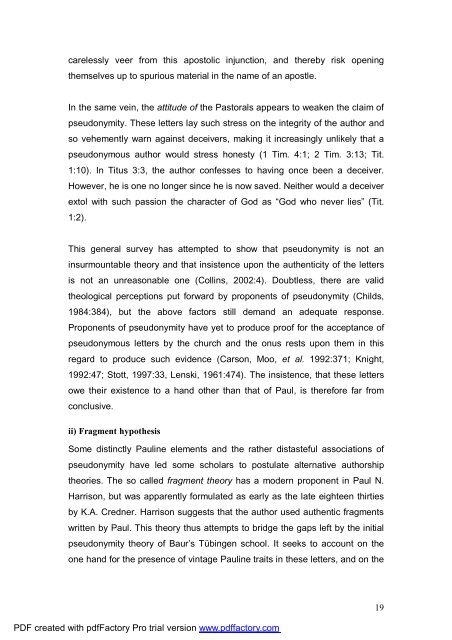A Text centred rhetorical analysis of Paul's Letter to Titus
A Text centred rhetorical analysis of Paul's Letter to Titus
A Text centred rhetorical analysis of Paul's Letter to Titus
You also want an ePaper? Increase the reach of your titles
YUMPU automatically turns print PDFs into web optimized ePapers that Google loves.
carelessly veer from this apos<strong>to</strong>lic injunction, and thereby risk opening<br />
themselves up <strong>to</strong> spurious material in the name <strong>of</strong> an apostle.<br />
In the same vein, the attitude <strong>of</strong> the Pas<strong>to</strong>rals appears <strong>to</strong> weaken the claim <strong>of</strong><br />
pseudonymity. These letters lay such stress on the integrity <strong>of</strong> the author and<br />
so vehemently warn against deceivers, making it increasingly unlikely that a<br />
pseudonymous author would stress honesty (1 Tim. 4:1; 2 Tim. 3:13; Tit.<br />
1:10). In <strong>Titus</strong> 3:3, the author confesses <strong>to</strong> having once been a deceiver.<br />
However, he is one no longer since he is now saved. Neither would a deceiver<br />
ex<strong>to</strong>l with such passion the character <strong>of</strong> God as “God who never lies” (Tit.<br />
1:2).<br />
This general survey has attempted <strong>to</strong> show that pseudonymity is not an<br />
insurmountable theory and that insistence upon the authenticity <strong>of</strong> the letters<br />
is not an unreasonable one (Collins, 2002:4). Doubtless, there are valid<br />
theological perceptions put forward by proponents <strong>of</strong> pseudonymity (Childs,<br />
1984:384), but the above fac<strong>to</strong>rs still demand an adequate response.<br />
Proponents <strong>of</strong> pseudonymity have yet <strong>to</strong> produce pro<strong>of</strong> for the acceptance <strong>of</strong><br />
pseudonymous letters by the church and the onus rests upon them in this<br />
regard <strong>to</strong> produce such evidence (Carson, Moo, et al. 1992:371; Knight,<br />
1992:47; S<strong>to</strong>tt, 1997:33, Lenski, 1961:474). The insistence, that these letters<br />
owe their existence <strong>to</strong> a hand other than that <strong>of</strong> Paul, is therefore far from<br />
conclusive.<br />
ii) Fragment hypothesis<br />
Some distinctly Pauline elements and the rather distasteful associations <strong>of</strong><br />
pseudonymity have led some scholars <strong>to</strong> postulate alternative authorship<br />
theories. The so called fragment theory has a modern proponent in Paul N.<br />
Harrison, but was apparently formulated as early as the late eighteen thirties<br />
by K.A. Credner. Harrison suggests that the author used authentic fragments<br />
written by Paul. This theory thus attempts <strong>to</strong> bridge the gaps left by the initial<br />
pseudonymity theory <strong>of</strong> Baur’s Tübingen school. It seeks <strong>to</strong> account on the<br />
one hand for the presence <strong>of</strong> vintage Pauline traits in these letters, and on the<br />
PDF created with pdfFac<strong>to</strong>ry Pro trial version www.pdffac<strong>to</strong>ry.com<br />
19

















